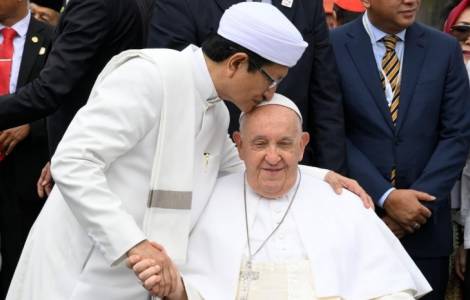
Vatican Media
Jakarta (Agenzia Fides) - "In the face of today’s many challenges, we respond with the sign of fraternity." The third and final day of Pope Francis' stay in Jakarta, the capital of Indonesia and the first stop on his Apostolic Journey to Asia and Oceania, was dedicated to interreligious dialogue and spirituality. In the morning, the Pope visited "Istiqlal" mosque, where he was received by the Grand Imam, Nasaruddin Umar.
Together they visited the "Tunnel of Friendship" that connects the cathedral to the mosque (see Fides, 23/7/2024). "I am grateful to those who work with the conviction that we can live in harmony and peace, and are aware of the need for a more fraternal world," said the Bishop of Rome in front of the tunnel. The Pope and the Imam then went to the large tent where the interreligious meeting is taking place.
After a traditional Muslim welcome dance, a short singing of a passage from the Koran, the reading of the parable of the Good Samaritan from the Gospel of Luke and the greeting by the Imam, the Pope gave his speech. This was followed by the signing of the "Joint Declaration of Istiqlal 2024". Here are the most important passages from the Pope's speech:
I am happy to be here, in the largest Mosque in Asia, together with all of you.
This Mosque was designed by the architect Friedrich Silaban, a Christian who won the design competition. This testifies to the fact that throughout the history of this nation and in the very fabric of its culture, the Mosque, like other places of worship, are spaces of dialogue, mutual respect and harmonious coexistence between religions and different spiritual sensibilities. This is a great gift that you are called to cultivate every day, so that religious experiences may be reference points for a fraternal and peaceful society and never reasons for close-mindedness or confrontation
In this regard, mention should be made of the underground tunnel, the “tunnel of friendship”, connecting the Istiqlal Mosque and the Cathedral of Saint Mary of the Assumption. This is an eloquent sign, allowing these two great places of worship not only to be “in front” of each other, but also “connected” to each other.
I encourage you to continue along this path so that all of us, together, each cultivating his or her own spirituality and practicing his or her religion, may walk in search of God and contribute to building open societies, founded on reciprocal respect and mutual love, capable of protecting against rigidity, fundamentalism and extremism, which are always dangerous and never justifiable.
Bearing in mind all that has been said, which is symbolized by the tunnel, I would like to leave you with two suggestions to encourage you on the path of unity and harmony that you have already embarked upon.
The first is always look deeply, because only in this way can we find what unites despite our differences.
By looking deeply, grasping what flows in the depths of our lives, the desire for fullness that dwells in the depths of our hearts, we discover that we are all brothers and sisters, all pilgrims, all on our way to God, beyond what differentiates us.
The second suggestion is to preserve the bonds between you. The tunnel was built in order to create a link between two different and distant places.
Sometimes we think that a meeting between religions is a matter of seeking common ground between different religious doctrines and beliefs no matter the cost. Such an approach, however, may end up dividing us, because the doctrines and dogmas of each religious experience are different. What really brings us closer is creating a connection in the midst of diversity, cultivating bonds of friendship, care and reciprocity.
They are also bonds that allow us to work together, to move forward together in pursuit of the same goals: defence of human dignity, the fight against poverty and the promotion of peace.
“Fostering religious harmony for the sake of humanity” is the path that we are called to follow. It is also the title to the joint declaration prepared for this occasion. By adhering to it, we take on the responsibility to address the serious and sometimes dramatic crises that threaten the future of humanity such as wars and conflicts, which are unfortunately caused at times by the manipulation of religion, and the environmental crisis, which is an obstacle to the growth and coexistence of peoples. And in the face of these crises, it is important that the values common to all religious traditions be effectively promoted in order to help society “defeat the culture of violence and indifference” (Joint Declaration of Istiqlal) and promote reconciliation and peace. (F.B.) (Agenzia Fides, 5/9/2024)